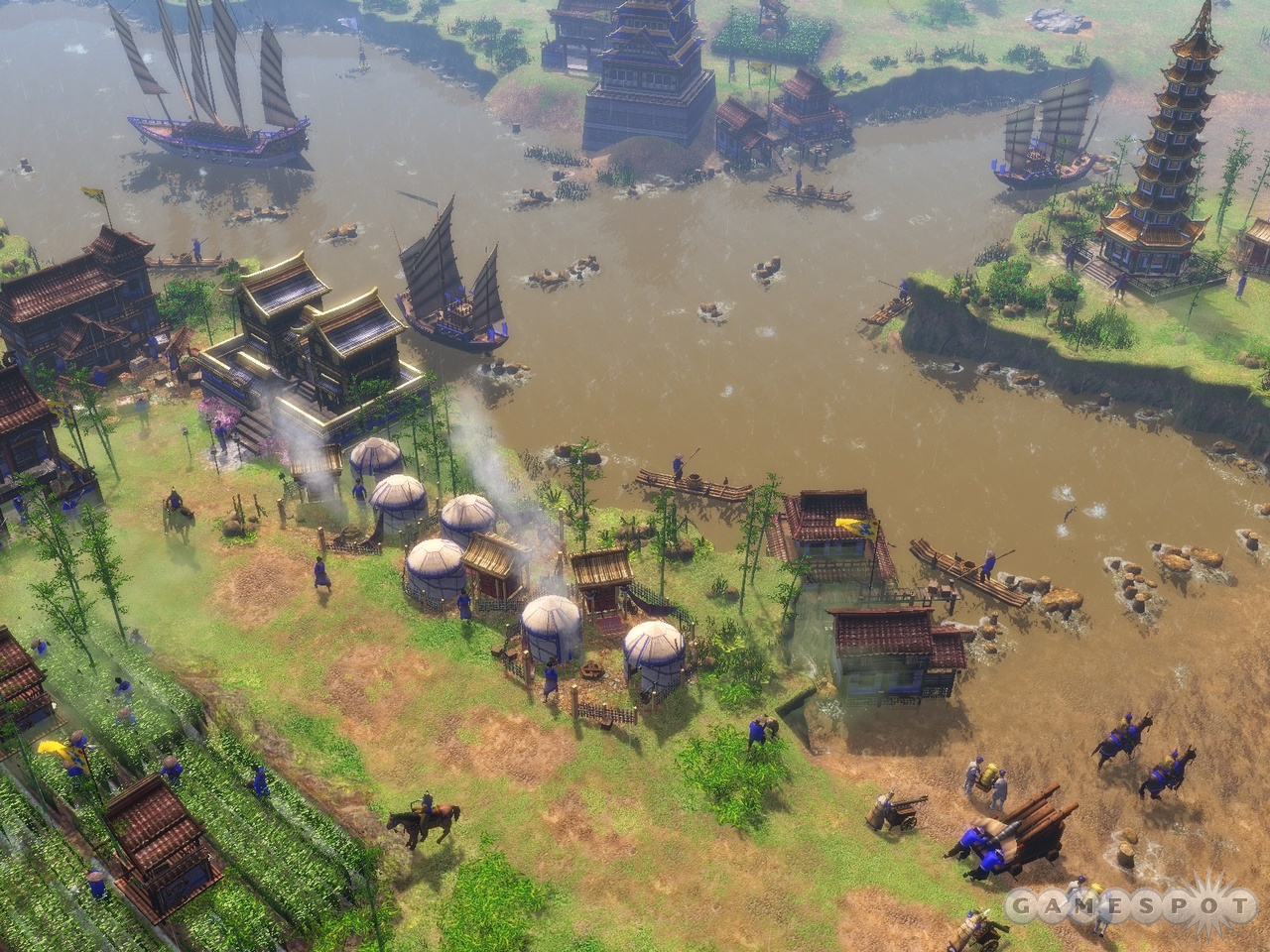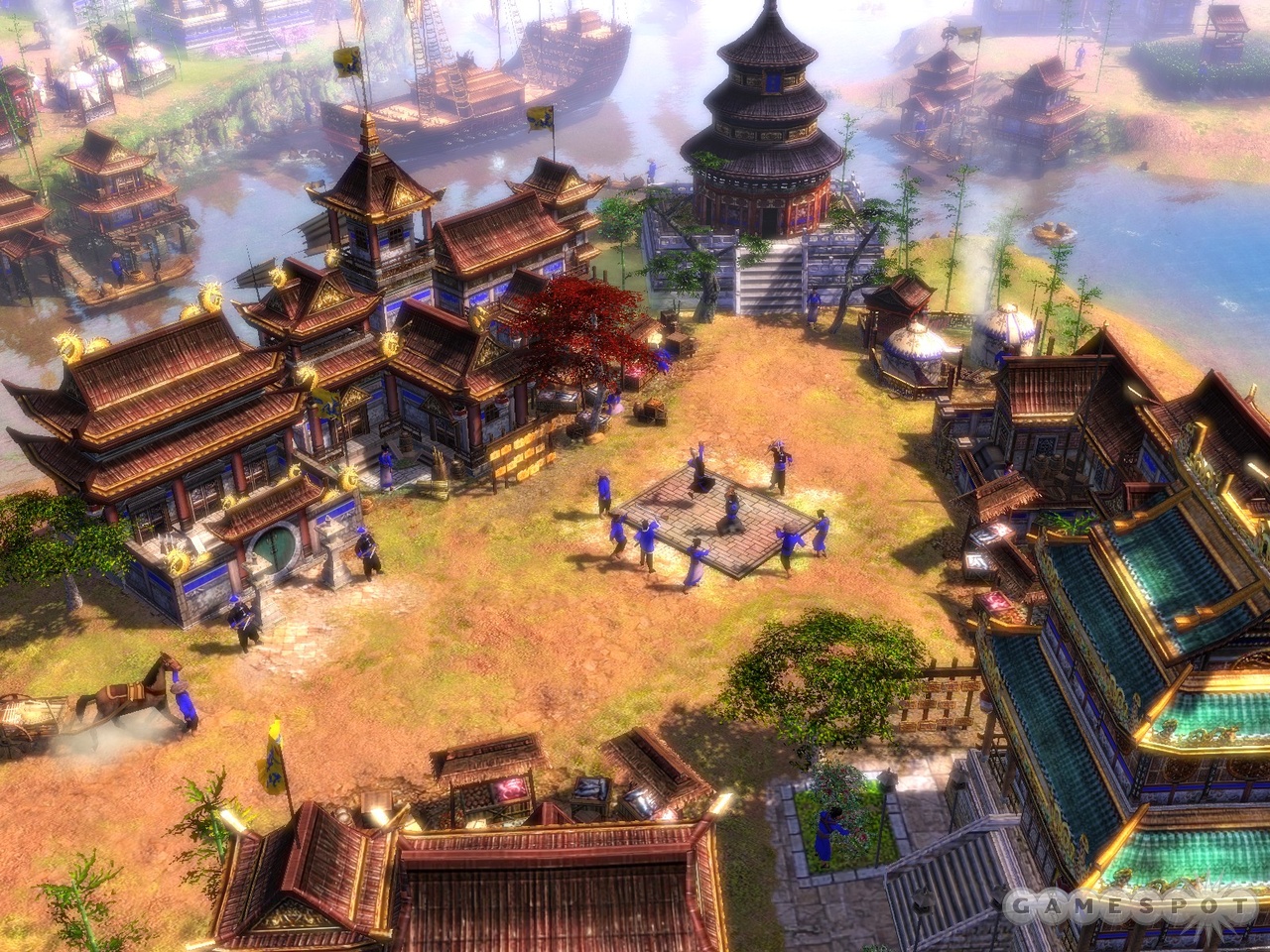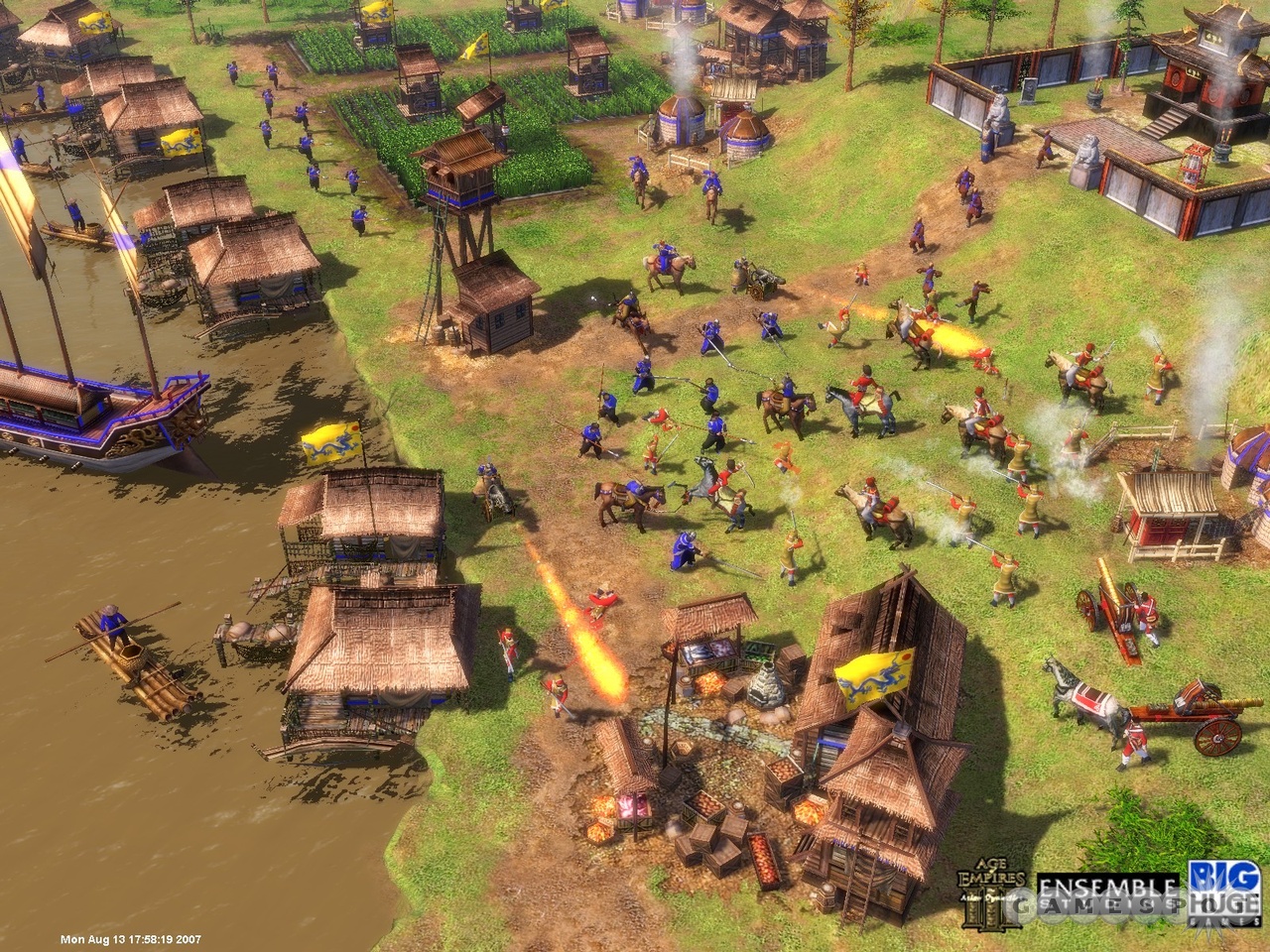Age of Empires III: The Asian Dynasties Updated Q&A - Details on China
Brian Reynolds, CEO of Big Huge Games, returns to give us an overview of the China faction in this upcoming Age of Empires III expansion.
Microsoft's epic real-time strategy game Age of Empires III will get a bit bigger with The Asian Dynasties, the second expansion pack that will add new content and features to the historically themed series. In Age of Empires III you control a civilization from the age of exploration and colonization to the beginning of the industrial age. Your job: make your civilization thrive through economic and military development. In other words, create a town or city and improve and expand it by gathering resources, researching technologies, and building new structures. You also recruit military units to defend your borders or expand them by force. Due out later this year, The Asian Dynasties will introduce three new civilizations in addition to a host of new units and wonders, which are powerful structures that bestow special bonuses and abilities. We previously covered the Japanese and Indian factions, and now we have the details on the third and final addition: China. To give us the details, we turned to Brian Reynolds, creative director and CEO of developer Big Huge Games.

GameSpot: Tell us about China as a faction, and its unique abilities and characteristics. For instance, will the nation's sizeable population figure into what the nation is all about in the game?
Brian Reynolds: When thinking about playing the Chinese in a strategy game, it is certainly intuitive to think, "There should be a lot of Chinese people!"--and indeed, several of China's powers fall along this line. First of all, China's maximum population cap is higher than that of other civs. Secondly, the traditional cards that ship "2 settlers," "3 settlers," and so on have been replaced with migration cards. These cause each of your villages and town centers to produce a free villager, so the more time you spend preparing before shipping a migration card, the more benefit you will get.
Also, although the Chinese have some specialized and very powerful, unique artillery units, their mainline infantry and cavalry units tend to emphasize the "lots and lots of somewhat weaker units" theme. Banner armies allow the Chinese to mobilize large numbers of units quickly, and some of the special Chinese military cards also emphasize this theme. Several of the Chinese wonders can also generate streams of free units, sort of like a factory set to produce artillery units.
GS: What aspects of Chinese history will make an appearance in the game? How much of the tumultuous 19th-century history of China, which included the First Opium War, the Taiping Rebellion, and the Boxer Rebellion?
BR: Some of the events you mention are referenced indirectly in the form of "cards," though our solo campaign for China deals with an earlier period of history.
GS: Give us a sense of what the Chinese forces will be like, and how the nation's unique history and culture informed their design.
BR: The most important feature of the Chinese military is the banner army, which reflects the actual organization of Chinese armies in this period. Instead of separate barracks and stable buildings, the Chinese have a war academy that produces both infantry and cavalry. But units are always produced in a banner army, which combines two different types of units. For example, the Old Han Army produces Chu Ko Nu archers and Qiang pikemen, whereas other armies combine cavalry with infantry or contain two different types of cavalry (some armies even include artillery). These armies can be both a strength, because the units are produced a bit more efficiently than most other civs, and a weakness, because you must build in large batches and can't get "just pikemen" when that's what you most need, though these effects are mitigated by the many different combinations of units available.
The Chinese, inventors of gunpowder, also have early access to some quite unique artillery units: both the flying crow rocket unit, which can be obtained rather early if the correct wonder is built, and the "flamethrower," which can be built at a castle from Age 2.
GS: Aside from military forces, what other paths to victory will China have in the game? How will wonders of the world play into this nation's strategy?

BR: Economically, the Chinese are very strong. Their villages are a combination of a house and a livestock pen. Additionally, villages can garrison villagers, providing defense against raids. There are also a few cards that interact with villages in interesting ways. Instead of the normal villager shipment cards that most other factions have, the Chinese have cards that will spawn a villager at each village and town center. Similarly, they have cards that will spawn a goat or a water buffalo at each village and town center. In the industrial age, they get a card that combines both those concepts, spawning a villager and a fattened goat at every village and town center.
As for their wonders, the Chinese have some tough choices to make. If players want to go an economic strategy, they can build the Porcelain Tower, which generates the player's choice of food, wood, coin, or a small trickle of all resources, including experience and export points. For the more military-minded, there's the Confucian Academy and the Summer Palace. The Confucian Academy autospawns the flying crow. The Summer Palace autospawns the player's choice of banner armies. For players that like to heal their units after losses, there's the Temple of Heaven. It has a spell that will heal all of the player's units on the map, and also gives the Chinese monk the ability to heal other units out of combat. The last wonder, the White Pagoda, also affects the Chinese monk. It increases the attack and hit points of the Chinese monk and his disciples, as well as increases the amount of disciples he can train.
GS: What special properties will the Chinese home city have, and will the nation have any unique cards, or card-related abilities?
BR: One of the specials has already been described in passing: -the migration cards to send villagers. Then there's the shippable combination armies, which cost a food premium but provide massive numbers of units, and Confucius' Gift with its super-fast shipment and technology-research potential.
There are also cards that allow your villages to shoot back at enemy troops, and even to muster irregulars (the Asian equivalent of militia). There's a card to give you an additional Shaolin master, a very powerful monk unit. Also, some of the "classic" European cards have slightly different themes for the Asian nations--for example, where a European civ would have "advanced trading post," China can send "trade empire," which doesn't let the trading posts shoot back but sends a free trading-post wagon.
GS: What can you tell us about the Chinese campaign in the expansion and the period of history it will cover?
BR: The Chinese campaign is the first in the sequence of three campaigns and covers the hypothetical possibility of a Ming treasure fleet reaching the New World in the early 15th century, before the time of Columbus. The "home city" for this part of the campaign is your massive treasure fleet, and in some scenarios you may have one or more treasure ships waiting off the coast, gradually offloading crates of resources during the scenario.

GS: Now that development of the game is drawing to a close, how is the China faction shaping up in multiplayer? What kind of strategies seem to work best for this nation?
BR: China has some interesting possibilities in multiplayer. Its banner armies allow it to field larger armies than most other factions. It doesn't hurt that China has a larger population cap than other factions either. The Chinese also have some interesting cards that ship gigantic armies from their home city. These cards cost quite a lot of resources to send, but they can often swing the tide of a battle. One example is the "Ever Victorious Army," which is an industrial-age card that sends a large amount of iron flail heavy cavalry and flying crow artillery for a cost of 2,000 food. Generally, Chinese players will want to go on the offensive, as they tend to do better using their numbers advantage than sitting back and trying to counter what their opponent is sending.
That's not to say there aren't other options for the Chinese player. In the colonial age, it's common for the Chinese player to boom with his cards that spawn units at his village and town center. Another strategy involves Confucius' Gift. It makes all technologies research instantly and all home-city shipments arrive very quickly. Combine Confucius with cards that ship gigantic amounts of units, and a fast industrial age becomes very tempting.
GS: Thank you, Brian.
Got a news tip or want to contact us directly? Email news@gamespot.com
Join the conversation